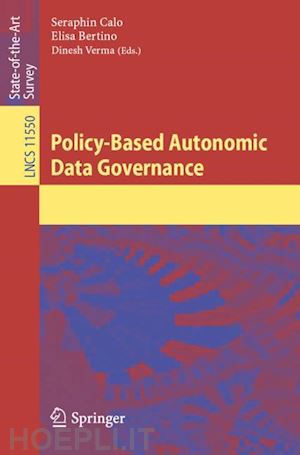
Questo prodotto usufruisce delle SPEDIZIONI GRATIS
selezionando l'opzione Corriere Veloce in fase di ordine.
Pagabile anche con Carta della cultura giovani e del merito, 18App Bonus Cultura e Carta del Docente
Advances in artificial intelligence, sensor computing, robotics, and mobile systems are making autonomous systems a reality. At the same time, the influence of edge computing is leading to more distributed architectures incorporating more autonomous elements. The flow of information is critical in such environments, but the real time, distributed nature of the system components complicates the data protection mechanisms. Policy-based management has proven useful in simplifying the complexity of management in domains like networking, security, and storage; it is expected that many of those benefits would carry over to the task of managing big data and autonomous systems.
This book aims at providing an overview of recent work and identifying challenges related to the design of policy-based approaches for managing big data and autonomous systems. An important new direction explored in the book is to make the major elements of the system self-describing and self-managing. This would lead to architectures where policy mechanisms are tightly coupled with the system elements. In such integrated architectures, we need new models for information assurance, traceability of information, and better provenance on information flows. In addition when dealing with devices with actuation capabilities and, thus, being able to make changes to physical spaces, safety is critical. With an emphasis on policy-based mechanisms for governance of data security and privacy, and for safety assurance, the papers in this volume follow three broad themes: foundational principles and use-cases for the autonomous generation of policies; safe autonomy; policies and autonomy in federated environments.
Systems, use-cases and foundational principles underlying generative policies.- AGENP: An ASGrammar-based GENerative Policy Framework.- Value of Information: Quantification and Application to Coalition Machine Learning.- Self-Generating Policies for Machine Learning in Coalition Environments.- Approaches and techniques for safe autonomy.- Can N-version Decision-Making Prevent the Rebirth of HAL 9000 in Military Camo? Using a “Golden Rule” Threshold to Prevent AI Mission Individuation.- Simulating User Activity for Assessing Effect of Sampling on DB Activity Monitoring Anomaly Detection.- FADa-CPS – Faults and Attacks Discrimination in Cyber Physical Systems.- Techniques and Systems for Anomaly Detection in Database Systems.- Policies and autonomy in federated and distributed environments.- Towards Enabling trusted Artificial Intelligence via Blockchain.- Secure Model Fusion for Distributed Learning using Partial Homomorphic Encryption.- Policy based Identification of IoT Devices’ Vendor and Type by DNS Traffic Analysis.- Redundancy for the Autonomic Management of Fault-tolerance in the Internet of Things.











Il sito utilizza cookie ed altri strumenti di tracciamento che raccolgono informazioni dal dispositivo dell’utente. Oltre ai cookie tecnici ed analitici aggregati, strettamente necessari per il funzionamento di questo sito web, previo consenso dell’utente possono essere installati cookie di profilazione e marketing e cookie dei social media. Cliccando su “Accetto tutti i cookie” saranno attivate tutte le categorie di cookie. Per accettare solo deterninate categorie di cookie, cliccare invece su “Impostazioni cookie”. Chiudendo il banner o continuando a navigare saranno installati solo cookie tecnici. Per maggiori dettagli, consultare la Cookie Policy.